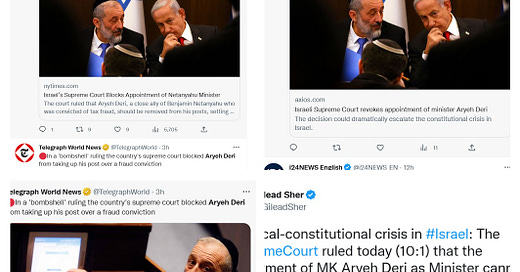Israel’s Supreme Court Ruling: Aryeh Deri Cannot Serve as a Minister in Netanyahu’s Government: The High Court, by a majority of ten to one, invalidated Deri's appointment to minister, based on its “extreme implausibility”.
The President of the Supreme Court Esther Hayut justified the decision by the Shas chairman's "extraordinary record of convictions," and pointed to a "repeated pattern of violating the rule of law" that obliges Netanyahu to remove him from his position. The justices who voted to rule against Deri serving as a minister emphasized the importance of upholding the rule of law, rather than succumbing to arguments of “popular vote” as well as the fact that Deri escaped a harsher punishment for his tax evasion felonies based on his promise to step down from political life. One justice was of the minority opinion that Deri's appointment should be left intact, yet PM Netanyahu should approach the chairperson of the election committee to decide whether there is dishonor in his actions.
The supreme court ruling caused a storm in the political arena, with opponents and supporters taking to the media and social networks. Deri’s party, the Sephardic Ultra-Orthodox, Shas stated in response to the court ruling: "The court's decision is political and tainted by extreme improbability”. Legal analysts claim that by emphasizing Deri’s failure to keep his promise to step down from political life, the supreme court put Netanyahu in a bind. Deri’s second conviction of tax evasion and the fact that he misled the court, was behind the most conservative justices’ decision to rule as they did.
While the Attorney General demanded that PM Netanyahu fire Deri, following the supreme court decision, the coalition is seeking ways to enable him to stay in office, as alternate PM, for example. This, to keep the coalition stable and avoid a crisis.
Coalition Pushes for Speedy Legislation, an Amendment of the Basic law: the Judiciary
Chair of the Constitution and Law Committee, Simcha Rothman (Religious Zionism) brought to the committee a more extreme version of an amendment to the basic law: The Judiciary, initially sponsored by minister of justice Yariv Levin (Likud). In Rothman's version, he proposes cancelling the reason of plausibility regarding elected officials, according to which the committee for the appointment of judges will include nine members with a clear political majority, including a majority for the members of the coalition. The proposed legislation is also designed to curtail the supreme court’s authority to question the validity of basic laws, and it may issue a decision amending a law only through a format that includes all the Supreme Court judges.
In an off the record conversation with legal analysts, senior members of the coalition admitted that Rothman’s proposal, was meant to send a message to the Attorney General, Gali Baharav-Miara, that she will need to compromise and opt for the initial, less radical version.
Dan Meridor, former Minister of Justice from the Likud, spoke to the committee and defined the government’s legal reform as "an attempt to destroy a glorious system built over 70 years." Meridor pointed to the danger of waging a campaign against the judiciary, in a country that is known to have no constitution and is controlled by the Knesset, and in most cases, by the government.
Public criticism against the overhaul clause, aimed at undermining the power of the judiciary is gaining traction. Leading law firms, financial institutions and high-tech entrepreneurs warn that the override clause, if passed, will harm Israel’s image and its economy.
Appointment Ceremony of Israel’s 23rd Chief of Staff Held This Week: Hertzi (Herzl) Halevi was appointed as the commander in chief of the Israeli Defense Force (IDF) in a ceremony at the Prime Minister’s office in Jerusalem. Halevi replaced Major General Aviv Kochavi, who concluded his four-year term as Chief of Staff. "We will maintain one IDF, moral and professional, free from any consideration other than security," Halevi said in his speech. Halevi’s appointment was approved by the former government, at the recommendation of former defense minister Benny Gantz. The former Netanyahu opposition challenged the appointment, claiming that it cannot be made during an election and transition period.
Defense Minister Yoav Galant pledged in his speech at the ceremony that he is determined to prevent political pressures from influencing the functioning of the army, and emphasized that the Chief of Staff reports directly to the Minister of Defense and is subject to the government. Commenting on political controversies surrounding the IDF, Minister of Defense Galant said: “I will make sure that external pressures, political, legal and other, stop at me and do not reach the gates of the IDF."
Prime Minister Benjamin Netanyahu said at the ceremony, referring to current security threats for Israel, specifically from Iran and its terrorist affiliates: "If we are willing to defend our country with all our might, we may not need an all-out campaign, and if so, the IDF will meet the challenge and the citizens of Israel will stand the test”.
In his speech, Halevi referred to Israeli society and the importance of the human element in the army and stated that “the uniqueness of the IDF is that it was, and still is, a mosaic of Israeli society." He also stated that he intends to prepare the army for war "against far and near arenas". Halevi also thanked his predecessor, Major General Kochavi, for all that he learned from him over the years, as his commander and colleague.
The outgoing Chief of Staff, Aviv Kochavi, said in his farewell speech that he is "grateful for the privilege of commanding an army with a power that the Jewish people have never had in all of history." Referring to the relationship between the army and Israeli society, Kochavi said: "In these days of polarization and discord, the joint service of people from all walks of Israeli society reminds us that we are one people, with one goal and with one common future."
After the ceremony, Halevi and Kochavi visited the Memorial Hall on Mount Herzl and the Western Wall. They later departed for a brief ceremony and toast at the IDF headquarters in Tel Aviv.
Hamas Releases Video of Israeli Captive to Signal Incoming Chief of Staff
The military wing of Hamas released a short video of Avera Mengistu, who has been held captive by them since 2014. Mengistu, a young Jewish-Ethiopian man coping with a mental disorder, crossed the Gaza border and was seized by Hamas. In the video, Mengistu says to the camera “how much longer will I remain in captivity? After so many years, where is the State and the people of Israel?”.
Confirming the authenticity of the video, the spokesman for Hamas, Hazem Kassem, said in an interview to a local Arabic language radio station that the video of Mengistu was filmed in recent weeks. Also, that the video was released on the same day that Major General Herzi Halevi was appointed the new IDF Chief of Staff to bring the issue back on the agenda and “to call on those responsible in Israel to move forward in negotiations if they wish to release Mengistu and the other captives, in exchange for Palestinian prisoners”.
Mengistu's family was deeply shaken by the video. His brother, Yalo, told the media that he is not sure he recognizes him, and that the security forces are checking the reliability of the video. “Either way”, he added, “if it is indeed Mengistu, this is the first documentation of him since he was captured by Hamas. Mengistu's mother, Agranesh, said in a recording released to the media “if I see his hands I will recognize him for sure”.
IDF spokesman Ran Kochav commented on the video and said that he "cannot confirm nor deny its level of credibility." In an interview with the IDF radio station, Kochav accused Hamas of cynically using such a humanitarian case for leverage.
Public Protests Against the Override Clause Continue to Gain Traction: more than 80,000 people participated in a mass rally in Tel-Aviv and several thousands more in Haifa and Jerusalem last Saturday, in protest against the government’s intent to pass a comprehensive rapid legal reform. Later in the week, thousands of students on campuses across the country joined the protests. The rallies ended peacefully in most cases, despite warnings from minister of national security Ben Gvir, that the police will forcefully detain anyone blocking a street.
The chair of the Israeli Bar Association, Avi Heimi, spoke at the main rally in Tel Aviv on Saturday night, and warned of the far-reaching implications of the intended “legal revolution” on Israeli democracy.
The organizers of the mass rally are planning to escalate the protests, and are expecting a bigger turnout on Saturday, fueled by public uproar regarding the coalition’s constant bashing of the supreme court over its ruling in the Deri case.
Yair Lapid, leader of the Knesset opposition (Yesh Atid) plans to attend the protest this weekend, after he was criticized for his absence last week.
Further Reading:
Deri: Here, here, here, here, here
Rapid overhaul legislation: Here, here, here, here
Chief of Staff: Here, here, here, here









